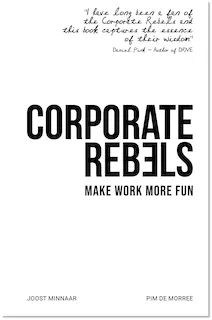
8 radical lessons from 150 of the world’s most inspiring companies. This book explores the stories and strategies of companies that have successfully implemented highly progressive and employee-centered approaches to work.

8 radical lessons from 150 of the world’s most inspiring companies. This book explores the stories and strategies of companies that have successfully implemented highly progressive and employee-centered approaches to work.
Quick thoughts from me:
It’s a really well written and structured book - each chapter covers a principle and ends with some practical things to think about - and it’ll be accessible to pretty much anyone. Any easy (and inspiring) read.
It’s not a book of thoughts and opinions. There’s loads of data as to why the current corporate thinking is broken - employees being so disengaged they actively sabotage the companies they work for, the fact that the majority of employees hate their managers, that command and control rules are there to keep the 3% in line and end up killing the other 97%, the effect of bad decision making. And then just loads of inspiring stories from progressive organisations on what they’ve done that’s worked (and hasn’t) to address these points based on the interviews the authors have done with these companies over the last X years.
And it has some really simple principles for adopting charge - inspire; don’t force; experiment and iterate; create a movement.
Some books for the reading list that it recommends:
A really inspiring read, it challenges much of the entrenched ‘Taylorism’ approach to running a business.
I love the concept of the bucket list, and that the book is written almost as a journal; with an informal, often hand written typeface, and whole pages are dedicated to a thought provoking statement or concept (even written upside down to engage the reader further)!
I really like the use of case studies, how each visit to a ‘bucket list’ entrepreneur, brings about new concepts (each within their own chapter of the book/journal), as well as reinforcing some common ‘rebel’ patterns.
With my own government background, I personally found Chapter 5 (From Rules and Control to Freedom and Trust) truly inspiring, to see so much being achieved by the Belgian Ministry of Social Security. Led by a thought leader in Frank van Massenhove, it was great to read how he unlocked the power of his Civil Servants to drive the changes across the whole department (this really resonated with me as I have used ‘John Kotters-8-Steps-approach to transformation’ and the ethos of ‘Enlisting the Volunteer Army’ to great effect in the Government sector).
With some many concepts, and ideas peppered through every chapter, I did like the final call-to-arms to ‘Join the Revolution’ where some of the core pattern of ‘principles’ are summarised, and I would be surprised if anyone who reads the book, doesn’t immediately take up the ‘call’ to ‘Spread the Word’ and ‘Join the Corporate Rebel Community’ - I know I have and there is loads of additional content on their Website, Newsletter and Blogs.
Who knows this may even inspire others to be Corporate Rebels!
I loved Corporate Rebels. A definite recommend. Here are my takeaways: